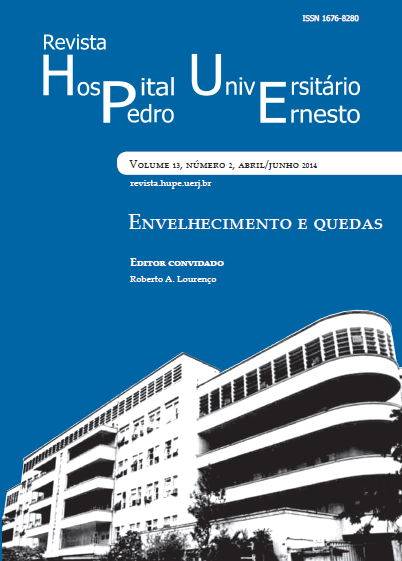O serviço social: abordagens e intervenções para o idoso que cai
DOI:
https://doi.org/10.12957/rhupe.2014.10125Resumo
Com o envelhecimento da população os eventos incapacitantes passam a fazer parte do rol de problemas que acometem a pessoa idosa brasileira. Discussões sobre o tema entram na agenda de questões relacionadas ao planejamento em saúde do idoso. Dentre esses assuntos, destacam-se as quedas, evento comum na população que envelhece. Aproximadamente 30% dos idosos sofrem quedas ao menos uma vez ao ano. Os episódios de quedas em idosos constituem importante problema de saúde pública. Trata-se, ainda, de assunto pouco valorizado, apesar de merecer uma abordagem eficaz por parte da equipe gerontogeriátrica. Face às repercussões que o evento acarreta, as avaliações acabam sendo pontuais, não havendo uma investigação dos motivos que ocasionarama queda e, consequentemente, não havendo orientações que possam fazer com que haja uma prevenção. O presente artigo tem como objetivo fazer um apanhado dos principais fatores associados às quedas, pontuando o impacto, sobretudo para a família que é a principal fornecedora de suporte aos idosos e, por esse motivo, o texto chama a atenção para um olhar direcionado à família e ao ambiente domicílio. Por fim, o texto tem a finalidadede apresentar os principais aspectos que devem ser levantados em uma avaliação social realizada com um idoso caidor, bem como sua família. A avaliação das condições sociais pode fornecer informações fundamentais para a intervenção terapêutica, contribuindo com o planejamento a ser elaborado pela equipe interdisciplinar. Aliado a isto, as ações socioeducativas, desenvolvidas em sala de espera nas unidades de saúde, constituem importantes ferramentas no âmbito da prevenção de potenciais problemas.
Descritores: Envelhecimento; Acidentes por quedas; Condições sociais; Serviços de assistência social; Vulnerabilidadesocial.
Revista HUPE, Rio de Janeiro, 2014;13(2):69-74
doi: 10.12957/rhupe.2014.10125


